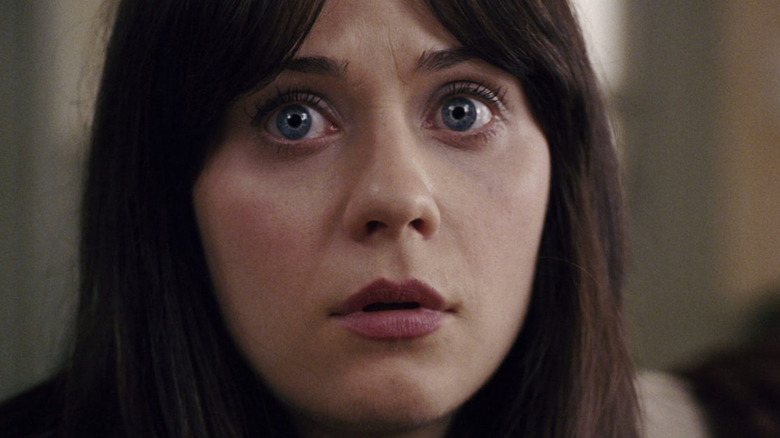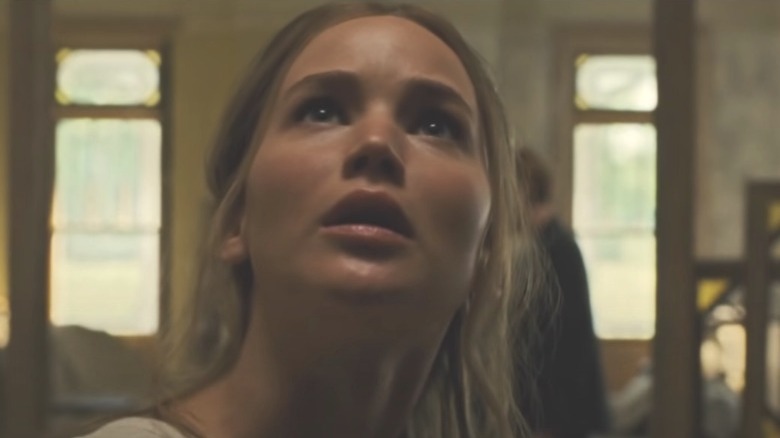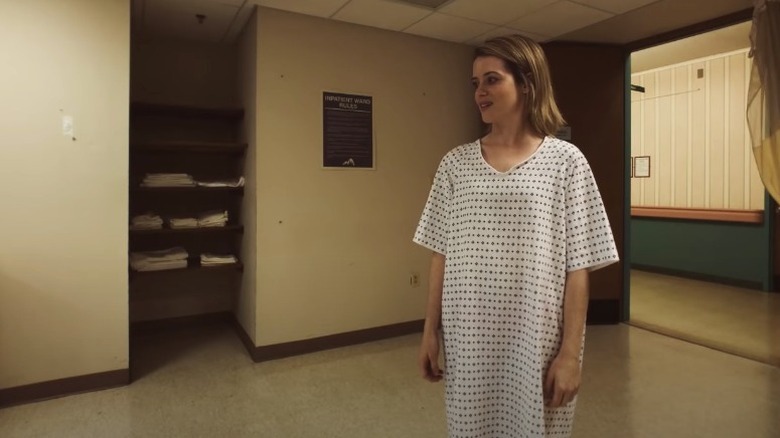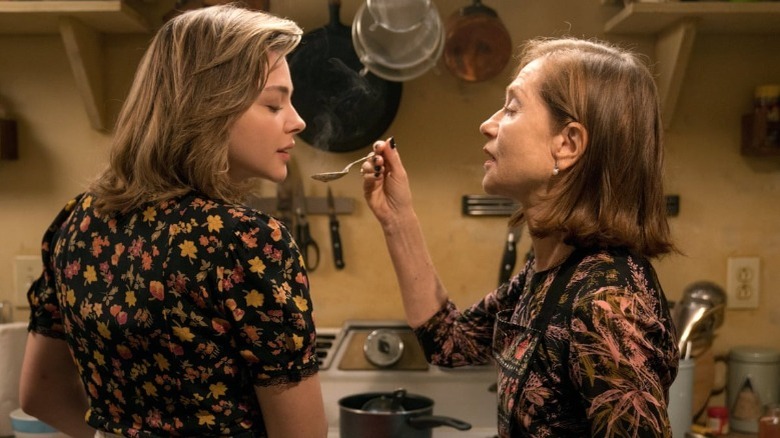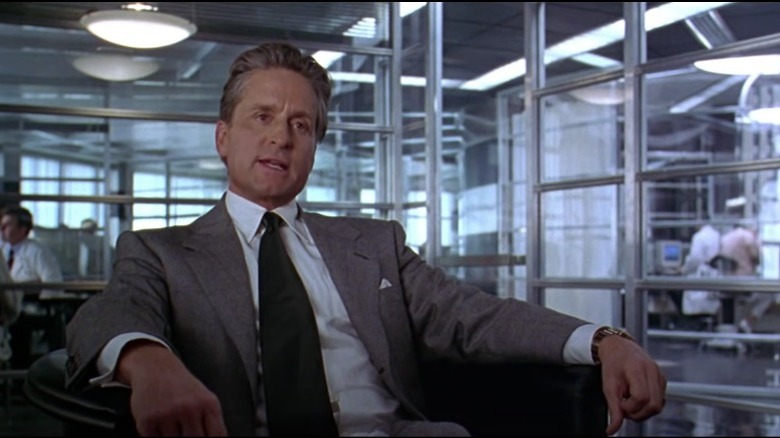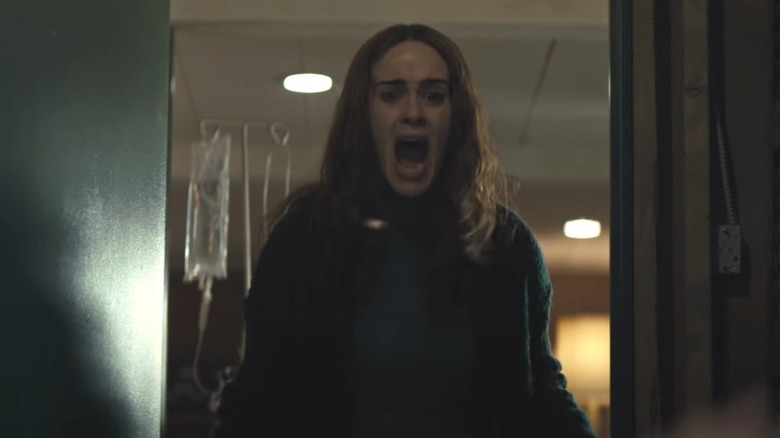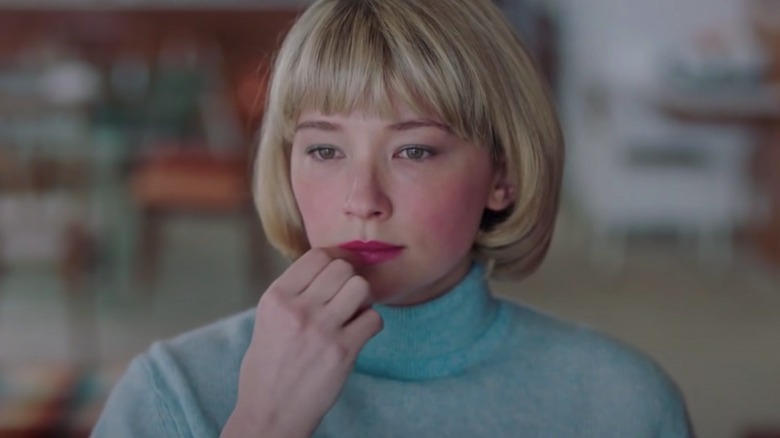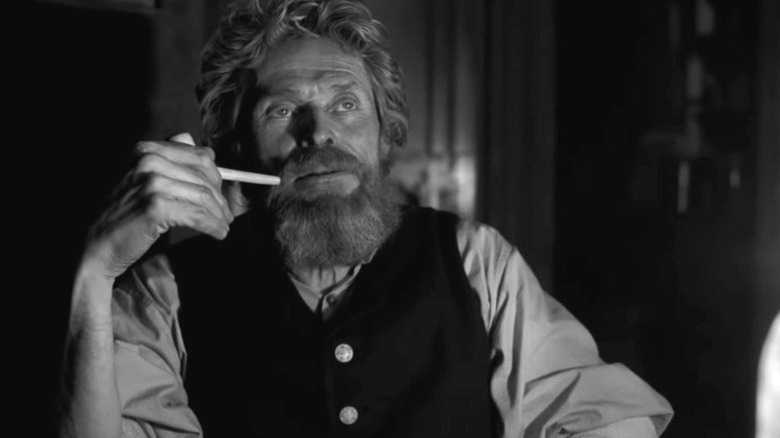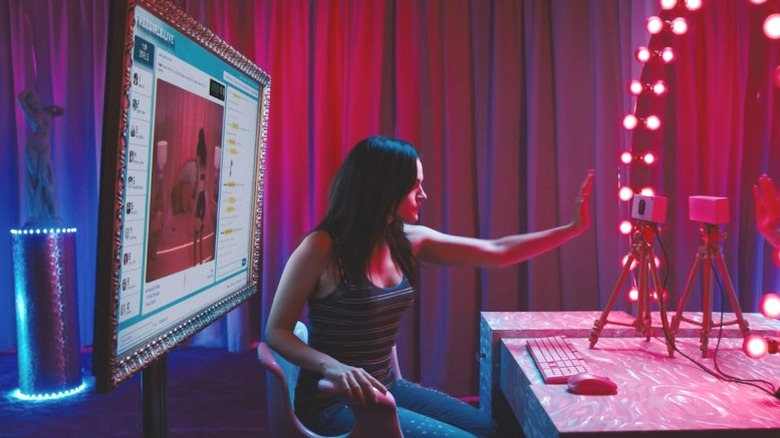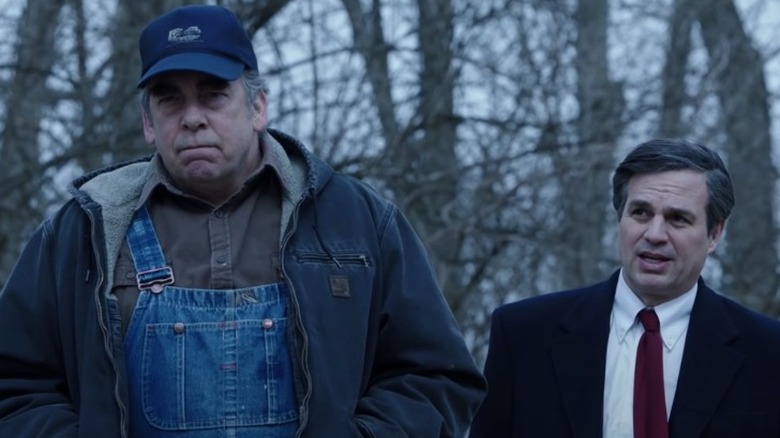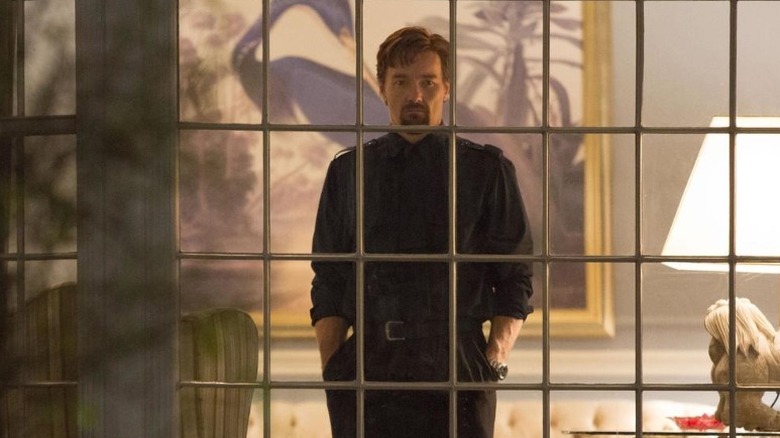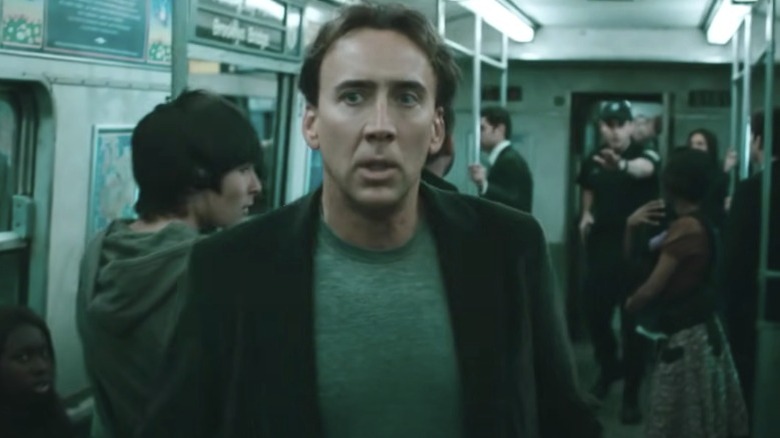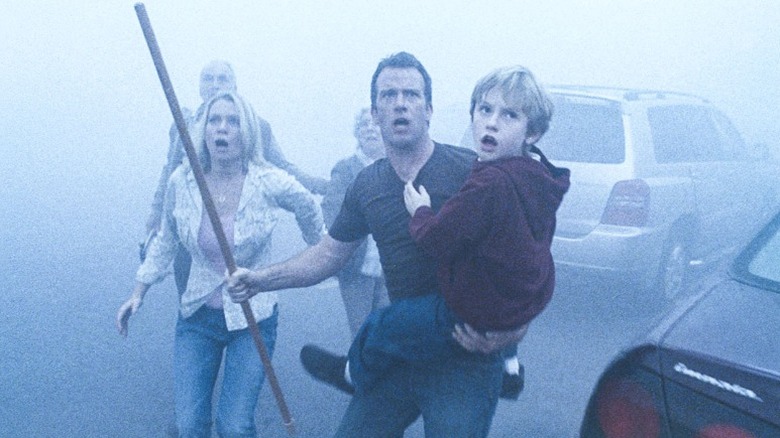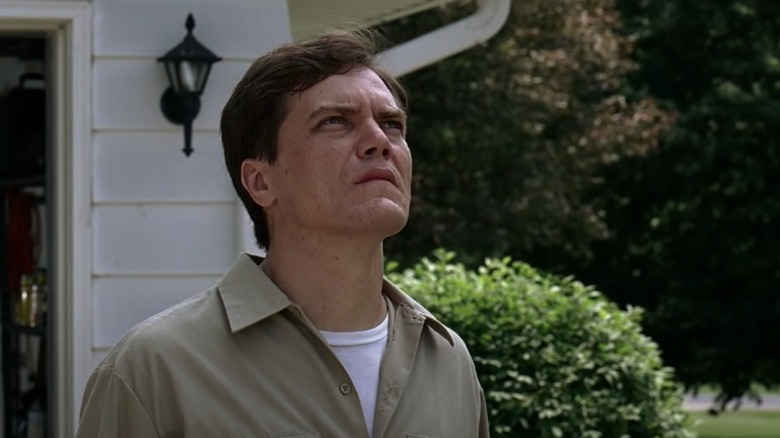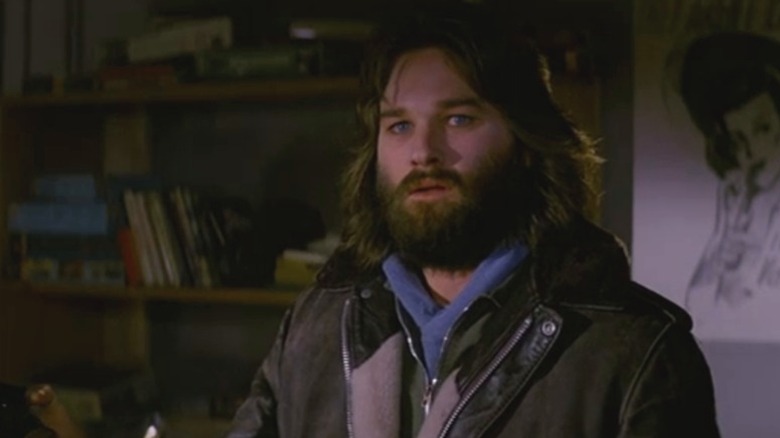Movies Like The Happening That M. Night Shyamalan Fans Need To Watch
We may receive a commission on purchases made from links.
M. Night Shyamalan has been a mainstay in Hollywood for decades now, and each film he releases attracts considerable attention. His name has become synonymous with major plot twists and the thriller genre. While Shyamalan films haven't always been critical darlings, fans are more often than not rewarded for heading to the cinema to see his latest film. However, if there's one thing that fans and critics have agreed on, is that "The Happening" is one of Shyamalan's worst films. In fact, it has the lowest audience approval rating of all of Shyamalan's films on Rotten Tomatoes.
Released in 2008, "The Happening," starring Mark Wahlberg and Zooey Deschanel, drew criticism for poor casting and a plot where nothing, ironically, ever happens. While it's clear it was poorly received on release, the film is more than worth a second look. It's likely that people simply weren't prepared for such a nihilistic, bordering on hopeless, movie. But there is something unique and exciting under the surface of the film, and "The Happening" delivers a genuine psychological thriller that keeps viewers guessing until the very end.
Some films on this list, just like "The Happening," were dismissed by fans and critics alike, but are well deserving of a second chance. For those who love thrillers, horror, and mysteries, here are films like "The Happening" that fans of M. Night Shyamalan need to watch.
Mother!
Despite being a box-office failure, "Mother!" is quite unlike any other film. It deftly weaves through various genres like romance, mystery, and a thriller before unfolding into pure horror. The film stars Jennifer Lawrence and Javier Bardem, along with Ed Harris and Michelle Pfeiffer. Despite having all the trappings of an art-house film, Paramount decided to push Darren Aronofsky's film as a wide release, releasing in over 2,000 theatres on opening weekend.
Critics were divided on "Mother!," as it holds a 68% rating on Rotten Tomatoes. Audiences were even less accepting of the film, and it's the rather unfortunate recipient of an F rating on CinemaScore, a dubious omen that only a handful of films have ever received. There could be many reasons for this — Jennifer Lawrence's role was a considerable departure for her fans, the extremely graphic violence may have turned people off, and the film's marketing made it seem like an entirely different film.
However, despite its poor initial reception, "Mother!" is a film worth exploring. It is a spellbinding experience that will keep you on the edge of your seat and constantly guessing — it is so completely unexpected that you could read an entire plot synopsis and still be baffled when you actually sit down to watch it. While there are strong biblical allegories, at its core, "Mother!" makes you feel just how terrifying it can be when nobody will believe you.
Unsane
Steven Soderbergh makes movies at a tremendous pace — he has directed five feature-length films in the last three years. A constant experimenter, Soderbergh released "Unsane" in 2018, his first film shot entirely on an iPhone. The film stars "The Crown" actress Claire Foy as Sawyer, a woman who leaves her Boston home to flee from a stalker. Despite getting her dream job, she finds herself still suffering from the trauma of being stalked, and books an appointment with a counselor. During the meeting, she unwittingly signs a consent form to be put under supervision for 24 hours, which proves to be the catalyst for far more than she bargained for.
Though it's easy to think that making a film on an iPhone would feel restrictive, in the hands of Soderbergh, "Unsane" still feels cinematic. Soderbergh cleverly uses the iPhone's technical limitations to enhance the feeling of claustrophobia that permeates the film. Foy is brilliant in the lead role and chilling supporting performances from Joshua Leonard and Juno Temple will keep viewers enthralled. The sustained sense of dread makes the 98-minute runtime fly by. The film was a box-office success, and "Unsane" cleverly tapped into the common fear of being ignored.
Greta
"Greta" is the latest film by the Oscar-winning writer of "The Crying Game," Neil Jordan. While on the New York City subway, Frances (Chloë Grace Moretz) discovers an unattended bag. After investigating, she returns the bag to its owner — Greta (Isabelle Huppert), a French widow who lives alone, passing the time playing classical music on her piano. The two strike up an unlikely friendship, but when Greta starts to intrude in Frances' life, things take a turn for the bizarre.
Isabelle Huppert has been a titan of the French Film industry for decades, and her English roles are few and far between. But "Greta" is especially enticing as it allows Huppert to showcase something she rarely gets to do: a quiet woman with a subtle evil brewing within her. Her performance is a joy to behold, and Moretz more than holds out against her. Maika Monroe, Colm Feore, and Stephen Rea round out the cast. "Greta" is a delightful psychosexual thriller that has some delightful twists, and is a whole lot of fun.
The Game
David Fincher is one of the most popular directors working in Hollywood today, with both "Se7en" and "Fight Club" being amongst many fans' all-time favorite films. But in-between those two hugely successful movies lies "The Game," Fincher's third film, which might just be his very best. While "Fight Club" showed Fincher's incredible promise as well as his impressive ability to direct, "The Game" built on that promise and showcased a director at the top of his game, and just three films into his remarkable career.
Michael Douglas stars as investment banker Nicholas van Orton. On his 48th birthday, he receives a gift from his estranged brother Conrad (a deliciously slimy Sean Penn): a voucher for a game, with the promise that it will change his life. What follows is a masterclass in audience manipulation — Fincher delights in pulling the strings and plays the audience like a puppet, winding through countless unexpected twists and turns to reach a terrifying ending. "The Game" is an enigmatic puzzle box of a film, and watching the secrets unfold is hugely satisfying. Douglas' performance is extremely satisfying. He never overplays the role and takes the twists with impressive finesse, and his intensity keeps viewers hooked.
Run
There's been a growing trend of films that unfold entirely on a screen: think "Unfriended," "Host," and many more. But one film that stood above the rest was "Searching," the astounding directorial debut from Aneesh Chaganty. Chaganty's breakout hit featured a father trying to do everything he can to save his daughter, but in his second film, the focus shifts to an overprotective mother.
Of course, when we say overprotective mother, we mean the mother from hell. "Run," starring Sarah Paulson as Diane, a woman who will do absolutely everything it takes to keep her daughter from leaving the house. Her daughter Chloe (Kiera Allen) is in a wheelchair and has a seemingly endless list of ailments, but Chloe's creeping suspicions threaten to unearth her mother's shocking secrets.
"Run" proves Chaganty is anything but a one-hit-wonder, and the film is a remarkable exercise in tension. There is no end to the increasing anxiety the film puts audiences through, and this is largely thanks to a terrifying turn from Paulson and an outstanding debut performance from Allen. Allen brings an exceptional physicality to her performance that forces viewers to believe her. If Hollywood gives her a chance, she could be a superstar in the making. Not only is "Run" genuinely thrilling, but it's also a watershed moment in diversity: as reported by Variety, Allen is the first actress who uses a wheelchair to star in a thriller in over 70 years.
Swallow
A film that flew under many radars in 2020, "Swallow" takes the psychological thriller in a bold new direction. Written and directed by Carlo Mirabella-Davis, the film stars Haley Bennett as Hunter, a young woman from a working-class family who has recently married Richie (Austin Stowell), a man from a wealthy family. Hunter and Richie live in a beautiful and expensive home, but Hunter feels increasingly isolated in her newfound domestic life. From the film's title, you may have guessed what "Swallow" is about — Hunter's anxiety leads to a newfound obsession with swallowing dangerous household items.
Mirabella-Davis' promising debut features a striking color palette that provides a stark contrast to Hunter's dangerous habit that threatens to kill her, and her unborn baby. "Swallow" is a unique portrait of grief and unresolved trauma that received considerable critical acclaim, and currently holds an 87% approval rating on Rotten Tomatoes. This is the kind of film that gets under your skin and stays in your mind long after it has ended.
The Lighthouse
Robert Eggers followed his chilling and singular horror debut "The Witch", with a film even more striking and original, which is no easy task. "The Lighthouse" is as psychological as horror gets, as it tells the story of two men who slowly but surely descend into madness as they are stationed at a remote lighthouse during a vicious storm. Anchored by the brilliant two-man principal cast of Robert Pattinson and Willem Dafoe and Oscar-nominated black and white cinematography, Eggers' film proves that a film doesn't need a whole lot going on to be completely engrossing.
The film also employs a 1.19:1 aspect ratio, which enhances the sense of claustrophobia the seamen are suffering from. It's reminiscent of early silent horror cinema films like "Nosferatu," and cinematographer Jarin Blaschke said in an interview with American Cinematographer that the aspect ratio "isolates our two characters even more, and truly traps them together when they do share a frame." Eggers' film is an impressive technical showcase that serves as a stark reminder that you don't need color to be frightening.
"The Lighthouse" frequently verges onto the absurd, and manages a surprising amount of laughs. Still, there's a feeling of dread and unease that permeates each frame as these two characters lose their grip on reality. With images of seagulls, baked beans, mermaids, lobsters, and tentacles, "The Lighthouse" may sound like nautical nonsense, but it is a nautical nightmare through and through.
Cam
Sometimes, the most exciting thrillers showcase a world unfamiliar to the average viewer. "Cam" is fascinating for its refreshing take on sex workers, a world that many may learn about for the first time through the film. Madeline Brewer stars as Alice, a cam girl who becomes increasingly popular online, slowly but surely rising in the online rankings. Alice, finally reaching the stability she sought after, is genuinely happy. But it doesn't last long — Alice finds herself locked out of her account, unable to perform, and, most importantly, unable to earn. The frustration turns into terror when Alice realizes that her account is active, and even worse, someone that looks identical to her is still performing as her online persona, Lola. Alice tries to explain to her colleagues what's happening to her, but nobody will listen, forcing Alice to take matters into her own hands.
Screenwriter Isa Mazzei used her past as a cam girl to inform her script, resulting in a nuanced, chilling, and thoughtful portrayal of sex work, something that Hollywood often sensationalizes. In an interview for Huck, Mazzei said "The response was so overwhelmingly positive and moving...A lot of sex workers said they felt seen and respected by the film." "Cam" also received great critical acclaim from critics, with a 93% approval rating at Rotten Tomatoes. The film has received plenty of praise for Brewer's lead performance and its discussion of sex work, but it's also wonderfully suspenseful and genuinely frightening.
Dark Waters
Though "Dark Waters" is not what you'd immediately think of when thinking of a thriller, Todd Hayne's brilliant and deeply underappreciated film is as bone-chilling as they come. Just like "The Happening," this film is all about the horrors in our environment. However, "Dark Waters" is based on a true story, and has been praised for its accuracy and attention to detail.
Director Haynes has played with genre throughout his career, directing everything from biopics to sumptuous melodrama, and while "Dark Waters" is one of his more straightforward efforts, it is a great example of how to keep audiences on the edge of their seats. MCU star Mark Ruffalo is Robert Bilott, a corporate defense lawyer from Cincinnati. His life is thrown into turmoil when he meets farmer Wilbur Tennant (Bill Camp). Wilbur knows Robert's grandmother, and he's desperate — his livestock is dying, and he claims massive chemicals company DuPont is responsible.
Anchored by a great performance by Mark Ruffalo and an utterly brilliant turn from Bill Camp, "Dark Waters" is a frightening tale of how large corporations can destroy communities, seemingly without consequences. While the terror from other films on this list could be dismissed as fiction, "Dark Waters" is a faithful account of real events, and will linger in your mind long after it's done.
The Gift
When does receiving gifts stop being fun? If you're watching "The Gift," the answer is right away. The film is written and directed by Joel Edgerton, who also stars in the film. Jason Bateman and Rebecca Hall are Simon and Robyn, a couple who recently relocated from Chicago to Los Angeles. Edgerton plays Gordo, an old friend of Simon who suddenly reappears in his life. After an uncomfortable reunion at Gordo's house, Simon demands that Gordo stay away from their family. Gordo doesn't exactly follow Simon's request and instead begins to inundate the seemingly happy couple with increasingly creepy presents.
As many great thrillers do, "The Gift" takes an incisive look at a relationship under duress. Thankfully, as writer-director Edgerton has a unique spin on this, as the relationship issues stem from an external, malicious outsider, rather than within the marriage itself. That's not the only unique spin "The Gift" possesses, as, after the first act set up, the final two-thirds take the film in inspired and unexpected directions.
As writer-director and actor, Edgerton does impressive work. His character is an ingenious blend of creepy with childlike innocence and poses lots of interesting questions as to what a villain is. Hall is superb as always and reminds audiences why she is one of the best actresses in Hollywood. But it's Bateman who provides the biggest surprise — seen as a comedic actor, "The Gift" proves he has dramatic chops.
Knowing
One of the more critically maligned films on this list, Alexander Proyas' "Knowing" is worth a revisit. Despite its critical beatdown, it received praise from Roger Ebert, who called "Knowing" "frightening, suspenseful, intelligent and, when it needs to be, rather awesome."
Nicolas Cage stars as John Koestler, an astrophysics professor at the esteemed MIT. After the unveiling of a time capsule from 50 years ago at his son's elementary school, Koestler discovers a bizarre series of numbers. The numbers reveal the dates, coordinates, and death tolls of disasters through history, all completely accurate. Two entries haven't happened yet, which sends Koestler on a mission to see if he can change the course of action to stop these tragedies from occurring.
"Knowing" is worth a watch for its bravura performance from Cage, its unique science fiction angle, and its fascinating look at spirituality. Plus, "Knowing" has quite the shocking ending, and is a real conversation starter. While all the pieces may not come together satisfyingly, there's something spectacular in the way "Knowing" goes for broke in a way that few Hollywood blockbusters dare.
The Mist
Similar to "The Happening," "The Mist" is about a group terrified of their environment, as people keep dying in mysterious circumstances. The cause appears to be a looming mist that begins to engulf more and more of the sleepy town of Brighton, Maine. The film, based on the Stephen King novella, focuses on various townsfolk that end up at the local supermarket to get supplies in the wake of a major thunderstorm. While they fight for survival, the mist gets closer and closer as tensions rise. For those who dread going to the supermarket, "The Mist" is a chilling reminder that it could be so, so much worse.
"The Mist" has considerable pedigree behind the camera. Writer-Director Frank Darabont also adapted Steven King's "The Shawshank Redemption," a film so popular that it is the highest-rated film on all of IMDb. There's also plenty of pedigree on screen — the cast includes Thomas Jane, Marcia Gay Harden, Andre Braugher, and Toby Jones. While the mist is certainly threatening, the greatest horror in the film may just be Harden's Mrs. Carmody, a nightmare-inducing religious fanatic.
Take Shelter
Another psychological thriller with a not-so-subtle environmental angle, "Take Shelter" tells the story of a construction manager who lives happily with his wife and daughter. One day, he is plagued by apocalyptic visions of the world ending that begins to haunt him, and as his visions begin to take over, he takes things into his own hands to ensure his family's safety. Writer-director Jeff Nichols' film is an understated slow burn, which comes to life through two-time Oscar nominee Michael Shannon's raw performance as Curtis. Equally strong is another two-time Oscar nominee, Jessica Chastain, as his wife Samantha.
As Curtis becomes more and more certain of the end of days, the relationships between him and his family, and with the community at large, begin to sever. Curtis's obsession with building a shelter to protect his family from an event that nobody else believes unfolds slowly and manically, His sole obsession threatens to overtake the very reason he is doing it — the unending love he has for his wife and daughter. With an ending that is open to interpretation, "Take Shelter" is an impressive character study and a frightening tale of obsession.
The Thing
John Carpenter's "The Thing" has been creeping out audiences since it first hit screens in 1982. Featuring an outstanding cast including Kurt Russell, Wilford Brimley, Keith David, Richard Masur, and T.K. Carter, "The Thing" takes audiences to the remote continent of Antarctica. An American research station receives a distress call from a helicopter that belongs to a nearby Norwegian station. When the chopper goes down, the Americans head to the Norwegian base, where they discover that everyone has been killed, or has disappeared. At the base, they discover a strange creature and bring it back to their base. Unfortunately for the Americans, they discover that the creature is capable of taking over other life forms, which means that anyone, at any time, could be inhabited by the Thing.
While the plot is terror-inducing, the film more than delivers on its promise. The Antarctic setting adds an incredible sense of isolation. The score is horrifying, thanks to brilliant work from Ennio Morricone. The film's practical effects haven't aged a day and are as terrifying as ever, and, fair warning, certain images from the film will be burned into your brain forever. There's a reason "The Thing" has been a favorite for decades, and if you've never seen it, there's no better time than now.
